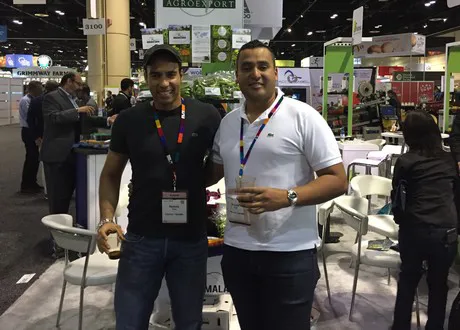Canada is a country in which many different cultures coexist, so the market has room for all kinds of trends and products, both traditional and exotic. The company Globimpex takes advantage of these market niches and imports a great variety of products from Honduras and Guatemala.

Products of Honduras and Guatemala
"We import all kinds of products all year-round," explains Heberto Reyes, of Globimpex. "Our biggest products are peas and tirabeques, but we also import many Asian vegetables from Honduras, such as Chinese aubergines, Thai aubergines, Indian bitter melons, Chinese bitter melon, bangaña, okra and other exotic vegetables. Depending on the window, we also work with exotic fruits, such as rambutan and mangosteen," he affirms.
"Moreover, we are currently starting with a new line of mini vegetables. We have mini carrots of different colours, already peeled and packaged in trays, which are becoming trendy." The producer adds that his peas, tirabeques and mini vegetables come from Guatemala, while the Asian vegetables are grown in Honduras.
Canada depends on the United States
In the Canadian market, Globimpex competes mainly against Peru, Mexico and the Dominican Republic, which also offer the same products all year round and at similar prices, although its biggest competitor for peas and tirabeques is China, which exports directly to Canada because its products are banned in the US.
In fact, the Canadian market is directly influenced by what happens in the US, as more than half of the products that arrive in Canada do so through the United States. "We offer good quality products to Canadian buyers, and we also work on general logistics, as we deal directly with customers to offer very competitive prices," continues the producer, who has a presence in much of Canada, including Montreal, Toronto and Vancouver. Reaching some of these regions, such as Vancouver, is very challenging, and the importer is always looking for ways to improve shipping times without costs skyrocketing. Using air transport would drastically reduce the competitiveness of its products, as it is especially costly for Honduras and Guatemala.
Transparent relationships
According to Reyes, Canadian buyers like to have direct and transparent relationships with their suppliers, as well as for their comments to be passed on to producers. "Canada is one of the most multicultural countries, so there is a big shift from traditional vegetables to exotic and healthy foods. In my case, I found a great opportunity in ethnic products, which are in great demand in Canada," explains the importer. "We supply one of the big supermarket chains, as well as vegetable wholesalers, so we have a competitive edge which allows us to continue expanding our range."
Difficult beginnings
The company Globimpex was founded four years ago by José and Heberto Reyes, both originally from Honduras, but who emigrated to Canada eight years ago. There they saw that there was a large market for exotic products from Central America, so after some difficult beginnings, they started to import all kinds of exotic products from Honduras and Guatemala. They also work in partnership with the producers in these countries and have representatives, mediators and logistics agents.
 More information:
More information:
Heberto Reyes
Globimpex
Canada
heberto.reyes@globimpex.ca
www.globimpex.ca

 More information:
More information:

 More information:
More information: